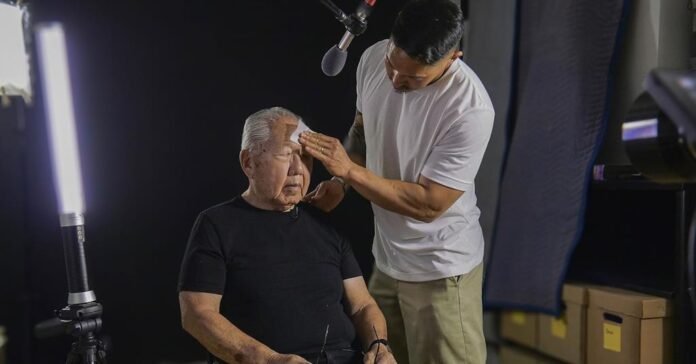Dir: Tadashi Nakamura. US. 2024. 93mins
Tadashi Nakamura’s intimate documentary focuses on his filmmaker father Robert A. Nakamura, who, in addition to being the ‘godfather of unbiased Asian American cinema’ can also be a beloved dad, husband and grandfather. The shut relationship between filmmaker and topic turns this deliberate celebration of a filmmaking legacy into one thing extra complicated, with the presence of the digicam enabling father and son to open up in ways in which shock them each. Having premiered in Sundance’s US Documentary competitors, Third Act will subsequent play Santa Barbara and ought to go on to a wholesome pageant profession, if not specialist distribution.
Feelings run excessive at instances
As filming begins in 2020, Tadashi — whose documentary Jake Shimabukuro: Life on 4 Strings gained a Gotham a decade in the past — articulates the acute duty he feels with this specific venture. “My entire life I at all times knew I needed to make a movie about my father,” he says. “I don’t need his work to be forgotten.” Initially at the very least, the work is the main target; we see Robert — who’s identified with Parkinson’s a 12 months into filming — pottering in his workplace, sorting negatives, guiding his son on digicam and microphone placement. There are additionally clips from Robert’s movies, together with 1975’s Wataridori: Birds Of Passage (which he made about his personal immigrant father) and 1980’s Hito Hata: Increase The Banner, in regards to the Japanese American expertise.
Simply as problems with cultural id knowledgeable Roberts work, additionally they change into the nucleus of Third Act — so named because it depicts the ‘third act’ of Robert’s life. Robert makes use of his son’s digicam as one thing of a confessional, expressing deep sorrow as he speaks in regards to the time he spent as a younger youngster in Manzanar, certainly one of 10 internment camps the place Japanese Individuals had been incarcerated through the Second World Conflict (and the topic of his 1972 brief Manzanar). Robert additionally discusses the on a regular basis racism that confronted him when his household returned to post-war Los Angeles.
As Tadashi learns extra about how his father’s previous formed his character, and his creativity — Robert turned to images and filmmaking as a way of protest, turning into a key participant within the anti-war motion through the Seventies — we are able to additionally see how a younger Robert was additionally uneasy together with his Asian ‘otherness’.
That is additionally an interesting have a look at the artwork of filmmaking itself, with Tadashi leaving in lots of candid moments — discussions over whether or not they need to recreate unfilmed moments, agonising over whether or not he ought to doc household gatherings or just savour time together with his father whereas he can. These questions change into extra acute as his father’s sickness forces him to confront troublesome concepts of mortality and loss.
Feelings run excessive at instances, however Tadashi and editor Victoria Chalk keep a balanced focus, and maintain Robert on the centre of his story. Tadashi’s mom, Karen — Robert’s second spouse and long-time producer — additionally will get loads of display time, and stays pragmatic and insightful in regards to the state of affairs they face. Robert, too, is basically circumspect and a compelling narrator of his personal life story, even when he’s typically involved about whether or not he makes for an fascinating topic.
Manufacturing firm: Era Movies
Worldwide gross sales: Submarine, information@submarine.com
Producers: Eurie Chung, Tadashi Nakamura
Cinematography: Tadashi Nakamura, Lou Nakasako, Jess X Snow, Justyn Ah Chong, ‘Aina Paikai, Evan Kodani, Quyen Nguyen-Le
Music: Miles Senzaki
